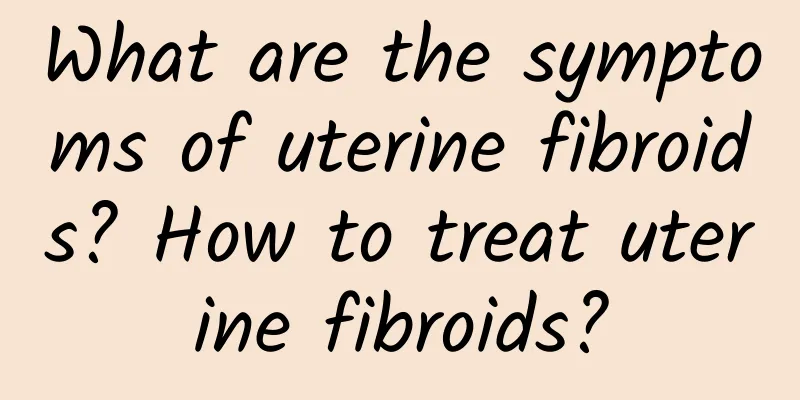What are the symptoms of uterine fibroids? How to treat uterine fibroids?

|
Fibroids may appear in a woman's uterus since the fetal period. Uterine fibroids are a common gynecological disease. According to statistics, about 70% of women over 40 years old will suffer from uterine fibroids. So, what are the symptoms of uterine fibroids? And how to deal with it? 1. Irregular menstruation. Women with uterine fibroids may experience irregular menstruation. Menstruation may become longer or the amount of bleeding may increase. In addition, the menstrual cycle may become shorter or longer. 2. Pelvic pain. Uterine fibroids can cause pelvic pain, which may be accompanied by a feeling of heaviness in the lower abdomen. In some cases, the pain may last for weeks, seriously affecting the patient's quality of life. 3. Frequent and urgent urination. If the uterine fibroids are located near the bladder, they may compress the bladder and cause symptoms of frequent and urgent urination. 4. Bowel movement problems. Uterine fibroids may also be adjacent to the intestines, thereby exerting pressure on the large intestine. This may cause constipation or painful bowel movements. 5. Decreased quality of sex life. Uterine fibroids may also cause pain during sex, thus affecting the sex life of the couple. This may have a certain impact on the relationship between the couple. So, how do we deal with these different symptoms? 1. Observation. For some mild uterine fibroids, the doctor may recommend observation to see if they will expand or worsen. 2. Drug treatment. For some patients, doctors may recommend some drugs to relieve symptoms. These drugs may include oral contraceptives, progesterone, or drugs that can regulate hormone levels. 3. Surgery. For some severe cases, doctors may recommend surgical treatment, such as myomectomy. The surgery can be performed through laparoscopic surgery or traditional resection, depending on the patient's specific situation. The above is a brief introduction to the symptoms and treatment of uterine fibroids. However, each patient's situation is unique, so when facing uterine fibroids, the best way to deal with it is to consult a professional doctor. They will provide the most suitable treatment plan based on the patient's specific situation. Female friends should maintain good living habits, have regular gynecological examinations, detect problems in time and take the right treatment methods to protect their health. |
<<: What to eat for uterine fibroids What to eat for uterine fibroids
>>: What foods can't patients with uterine fibroids eat?
Recommend
Are potato chips too tasty to quit? Nutritionists teach you these 3 tips to avoid getting fat
Walking into a store and seeing mountains of pota...
What are the six food groups? Teach you to easily calculate the calories and nutrients of each meal
How many calories are in a bowl of rice? Which ha...
Getting slim is super easy! Change the order of eating
When it comes to dietary rules for losing weight,...
Pelvic inflammatory disease can cause menorrhagia due to endometrial congestion
Pelvic inflammatory disease can cause menorrhagia...
It is difficult to give up starch to lose weight, the sugar-reducing rice cooker is the new savior! Famous weight loss doctor: Excessive restriction of sugar has these surprising consequences...
People who want to lose weight know that they nee...
Brief description: Several common symptoms of acute cervicitis
Acute cervicitis is a gynecological disease with ...
What causes uterine adenomyosis to grow? Does uterine adenomyosis grow fast?
What causes adenomyosis? This is a common concern...
Losing weight after childbirth is not a competition, take care of yourself first! 3 tips for breastfeeding and eating comfortably after childbirth, slimming down, beautifully and healthily
"A certain actress quickly regained her good...
Does subserosal uterine fibroids affect pregnancy? What are the effects of subserosal uterine fibroids?
The size and location of uterine fibroids are dif...
Overview of treatment and surgical costs for uterine fibroids
Diseases such as uterine fibroids seriously affec...
Daily care methods for dysmenorrhea
The main symptoms of dysmenorrhea are abdominal d...
The environment is also the key cause of vaginitis
The incidence of vaginitis has been very high in ...
What methods should be used to treat female cervical erosion? What are the misunderstandings in the treatment of female cervical erosion?
Ladies all know that nowadays, more and more peop...
What are the symptoms of irregular menstruation?
What are the symptoms of irregular menstruation? ...
How to relieve dysmenorrhea in girls
Common ways to relieve dysmenorrhea include adjus...









